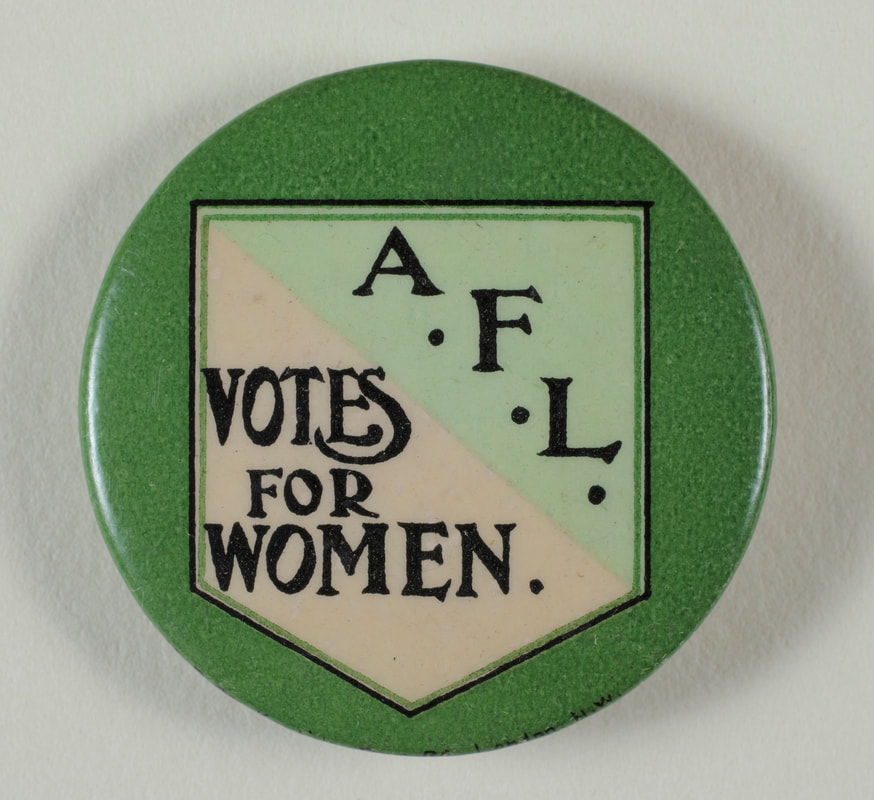|
The Actresses’ Franchise League (AFL) was founded in November 1908 by theatre professionals who wanted support the Votes for Women cause through their work. Any woman who was or had been in the profession was eligible to join, and the broad membership included many of the most famous actresses of the early twentieth century including Ellen Terry, Lily Langtry, Madge Kendal, as well as those who would go on to become well known after WW1, including May Whitty, Athene Seyler and Sybil Thorndike. The membership also included writers Gertrude Jennings and Cicely Hamilton, musicians Ethel Smyth and Liza Lehmann, theatre managers and producers Lena Ashwell, Edith Craig and Gertrude Kingston, singers Yvette Guilbert and Marie Brema, dancers Margaret Morris and Italia Conti, and music hall artistes Marie Lloyd and Kitty Marion. American actress Gertrude Elliot, the wife of suffragist actor-manager Johnston Forbes-Robertson, was the President of the League. By 1914 there were nearly a thousand members of the AFL, provincial secretaries in cities across the UK, an affiliated Men’s Group and over 100 Patrons, including Christabel Pankhurst. The League's sister society, the Women Writers' Suffrage League, was also founded in 1908.
The Actresses’ Franchise League worked with all the other suffrage societies - militant and non-militant - and was present for all of the most prominent events in the suffrage campaign between 1908 and 1914, organising performances at suffrage exhibitions and fairs, training and providing speakers for meetings and demonstrations, marching in processions, and putting on entertainments in theatres, restaurants, meeting rooms and even skating rinks. The AFL commissioned and published new writing, campaigned directly as an activist group alongside other suffrage societies and used the unique visibility and profile of its membership to gain press attention for the cause. Believing strongly in the power of theatre, propaganda and storytelling, the League’s output was ambitious, bold and hugely varied. In 1913, the AFL founded The Woman’s Theatre, designed to open up opportunities for women to be part of the business of theatre and to participate at every level, on and off stage. After a very successful first season, plans for a second had to be postponed due to the outbreak of the First World War. League members threw themselves into war work – founding the Women’s Emergency Corps and the British Women’s Hospital Fund, and restoring the original Star and Garter home in Richmond for disabled servicemen. The Woman’s Theatre became the Woman’s Theatre Camps Entertainments, taking variety shows that included short one-act comedies by suffragist playwrights to army camps in the UK and abroad. After the war, the League continued to work for equal suffrage, and the organisation remained actively involved with and supportive of a variety of campaigns until it was wound up in 1958. The League’s legacy is an inspiring one for scholars of feminist theatre, political theatre, theatre history and women’s history, as well as for current theatre professionals. Many of the issues around equality of opportunity within the industry are still pertinent today – and the AFL’s confident, clever, passionate and creative work and story still resonates with performers, audiences and activists.
1 Comment
|
NaomiThoughts, reflections, bits of research Archives
April 2023
Categories
All
|

 RSS Feed
RSS Feed